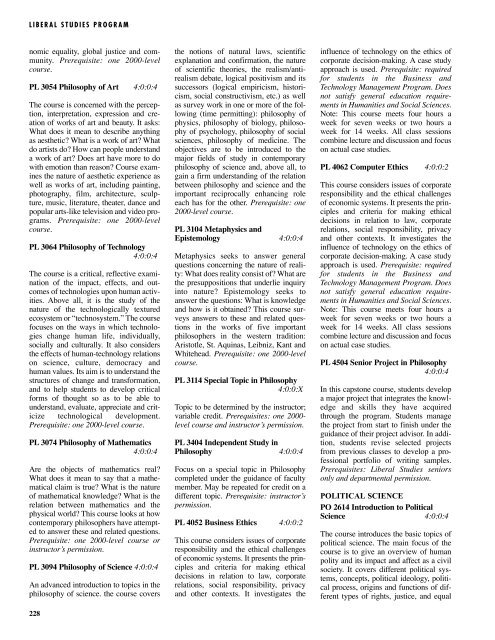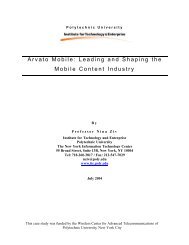POLYTECHNIC UNIVERSITY 2005-2007
POLYTECHNIC UNIVERSITY 2005-2007
POLYTECHNIC UNIVERSITY 2005-2007
Create successful ePaper yourself
Turn your PDF publications into a flip-book with our unique Google optimized e-Paper software.
LIBERAL STUDIES PROGRAM<br />
nomic equality, global justice and community.<br />
Prerequisite: one 2000-level<br />
course.<br />
PL 3054 Philosophy of Art 4:0:0:4<br />
The course is concerned with the perception,<br />
interpretation, expression and creation<br />
of works of art and beauty. It asks:<br />
What does it mean to describe anything<br />
as aesthetic? What is a work of art? What<br />
do artists do? How can people understand<br />
a work of art? Does art have more to do<br />
with emotion than reason? Course examines<br />
the nature of aesthetic experience as<br />
well as works of art, including painting,<br />
photography, film, architecture, sculpture,<br />
music, literature, theater, dance and<br />
popular arts-like television and video programs.<br />
Prerequisite: one 2000-level<br />
course.<br />
PL 3064 Philosophy of Technology<br />
4:0:0:4<br />
The course is a critical, reflective examination<br />
of the impact, effects, and outcomes<br />
of technologies upon human activities.<br />
Above all, it is the study of the<br />
nature of the technologically textured<br />
ecosystem or “technosystem.” The course<br />
focuses on the ways in which technologies<br />
change human life, individually,<br />
socially and culturally. It also considers<br />
the effects of human-technology relations<br />
on science, culture, democracy and<br />
human values. Its aim is to understand the<br />
structures of change and transformation,<br />
and to help students to develop critical<br />
forms of thought so as to be able to<br />
understand, evaluate, appreciate and criticize<br />
technological development.<br />
Prerequisite: one 2000-level course.<br />
PL 3074 Philosophy of Mathematics<br />
4:0:0:4<br />
Are the objects of mathematics real?<br />
What does it mean to say that a mathematical<br />
claim is true? What is the nature<br />
of mathematical knowledge? What is the<br />
relation between mathematics and the<br />
physical world? This course looks at how<br />
contemporary philosophers have attempted<br />
to answer these and related questions.<br />
Prerequisite: one 2000-level course or<br />
instructor’s permission.<br />
PL 3094 Philosophy of Science 4:0:0:4<br />
An advanced introduction to topics in the<br />
philosophy of science. the course covers<br />
228<br />
the notions of natural laws, scientific<br />
explanation and confirmation, the nature<br />
of scientific theories, the realism/antirealism<br />
debate, logical positivism and its<br />
successors (logical empiricism, historicism,<br />
social constructivism, etc.) as well<br />
as survey work in one or more of the following<br />
(time permitting): philosophy of<br />
physics, philosophy of biology, philosophy<br />
of psychology, philosophy of social<br />
sciences, philosophy of medicine. The<br />
objectives are to be introduced to the<br />
major fields of study in contemporary<br />
philosophy of science and, above all, to<br />
gain a firm understanding of the relation<br />
between philosophy and science and the<br />
important reciprocally enhancing role<br />
each has for the other. Prerequisite: one<br />
2000-level course.<br />
PL 3104 Metaphysics and<br />
Epistemology 4:0:0:4<br />
Metaphysics seeks to answer general<br />
questions concerning the nature of reality:<br />
What does reality consist of? What are<br />
the presuppositions that underlie inquiry<br />
into nature? Epistemology seeks to<br />
answer the questions: What is knowledge<br />
and how is it obtained? This course surveys<br />
answers to these and related questions<br />
in the works of five important<br />
philosophers in the western tradition:<br />
Aristotle, St. Aquinas, Leibniz, Kant and<br />
Whitehead. Prerequisite: one 2000-level<br />
course.<br />
PL 3114 Special Topic in Philosophy<br />
4:0:0:X<br />
Topic to be determined by the instructor;<br />
variable credit. Prerequisites: one 2000-<br />
level course and instructor’s permission.<br />
PL 3404 Independent Study in<br />
Philosophy 4:0:0:4<br />
Focus on a special topic in Philosophy<br />
completed under the guidance of faculty<br />
member. May be repeated for credit on a<br />
different topic. Prerequisite: instructor’s<br />
permission.<br />
PL 4052 Business Ethics 4:0:0:2<br />
This course considers issues of corporate<br />
responsibility and the ethical challenges<br />
of economic systems. It presents the principles<br />
and criteria for making ethical<br />
decisions in relation to law, corporate<br />
relations, social responsibility, privacy<br />
and other contexts. It investigates the<br />
influence of technology on the ethics of<br />
corporate decision-making. A case study<br />
approach is used. Prerequisite: required<br />
for students in the Business and<br />
Technology Management Program. Does<br />
not satisfy general education requirements<br />
in Humanities and Social Sciences.<br />
Note: This course meets four hours a<br />
week for seven weeks or two hours a<br />
week for 14 weeks. All class sessions<br />
combine lecture and discussion and focus<br />
on actual case studies.<br />
PL 4062 Computer Ethics 4:0:0:2<br />
This course considers issues of corporate<br />
responsibility and the ethical challenges<br />
of economic systems. It presents the principles<br />
and criteria for making ethical<br />
decisions in relation to law, corporate<br />
relations, social responsibility, privacy<br />
and other contexts. It investigates the<br />
influence of technology on the ethics of<br />
corporate decision-making. A case study<br />
approach is used. Prerequisite: required<br />
for students in the Business and<br />
Technology Management Program. Does<br />
not satisfy general education requirements<br />
in Humanities and Social Sciences.<br />
Note: This course meets four hours a<br />
week for seven weeks or two hours a<br />
week for 14 weeks. All class sessions<br />
combine lecture and discussion and focus<br />
on actual case studies.<br />
PL 4504 Senior Project in Philosophy<br />
4:0:0:4<br />
In this capstone course, students develop<br />
a major project that integrates the knowledge<br />
and skills they have acquired<br />
through the program. Students manage<br />
the project from start to finish under the<br />
guidance of their project advisor. In addition,<br />
students revise selected projects<br />
from previous classes to develop a professional<br />
portfolio of writing samples.<br />
Prerequisites: Liberal Studies seniors<br />
only and departmental permission.<br />
POLITICAL SCIENCE<br />
PO 2614 Introduction to Political<br />
Science 4:0:0:4<br />
The course introduces the basic topics of<br />
political science. The main focus of the<br />
course is to give an overview of human<br />
polity and its impact and affect as a civil<br />
society. It covers different political systems,<br />
concepts, political ideology, political<br />
process, origins and functions of different<br />
types of rights, justice, and equal




